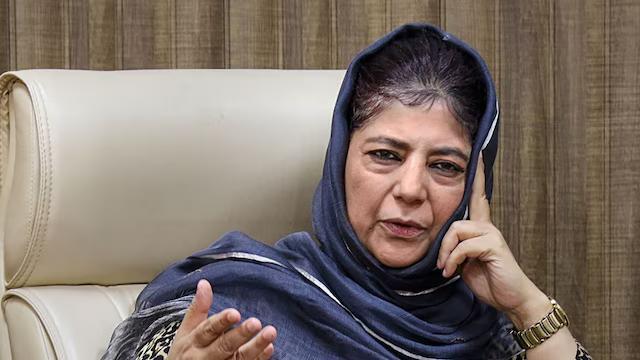
Mufti Alleges Foul Play After OGW Jumps in J&K River, Drowns; BJP Slams Her
In a shocking incident in Jammu and Kashmir’s Kulgam district, an overground worker (OGW) allegedly jumped into a river and drowned, triggering a political row between the ruling parties. Former Chief Minister Mehbooba Mufti has alleged foul play in the incident, claiming that locals have informed her that the worker was picked up by the Army two days ago.
According to reports, the OGW, identified as Abdul Rashid Bhat, jumped into the Lidder River in Pahalgam on Tuesday afternoon. Despite efforts by local residents and police to rescue him, Bhat succumbed to the cold waters and drowned.
Mufti, who is the president of the Peoples Democratic Party (PDP), took to Twitter to express her shock and concern over the incident. She alleged that the worker was picked up by the Army two days ago and questioned the circumstances surrounding his death. “What kind of security forces are we having? An overground worker is picked up by army 2 days ago & today he jumps into the river & drowns? Whose doing is this? What kind of accountability are we talking about?” Mufti tweeted.
However, the Bharatiya Janata Party (BJP) has slammed Mufti’s allegations, accusing her of playing politics over the incident. BJP leader Sanju Verma said that Mufti’s remarks were “baseless and motivated” and that she had a history of making such allegations.
“Mehbooba, after the Pahalgam terror attack, said, ‘Why blame Pakistan?'” Verma tweeted. “Now, she’s questioning the Army’s role in the OGW’s death. Her allegations are baseless and motivated. The Army is doing its job to maintain peace and security in the region.”
The incident has sparked a heated debate on social media, with many taking sides on the issue. While some have supported Mufti’s claims of foul play, others have dismissed them as baseless and politically motivated.
The incident also raises questions about the role of overground workers in Jammu and Kashmir. OGWs are individuals who have ties to militant groups but do not actively participate in violent activities. They often serve as informants, providing information to the militants and helping them to evade security forces.
The use of OGWs has been a contentious issue in the region, with some accusing them of being double agents and others defending them as ordinary citizens who are caught in the crossfire.
In recent years, there have been several instances of OGWs being arrested or killed by security forces, leading to accusations of human rights abuses. The Indian government has defended the use of OGWs as a necessary measure to combat terrorism, while criticising those who accuse them of being involved in militant activities.
As the investigation into Bhat’s death continues, it remains to be seen whether Mufti’s allegations of foul play will be proven or whether they will be dismissed as baseless. One thing is certain, however – the incident has once again highlighted the complex and contentious nature of the situation in Jammu and Kashmir.






